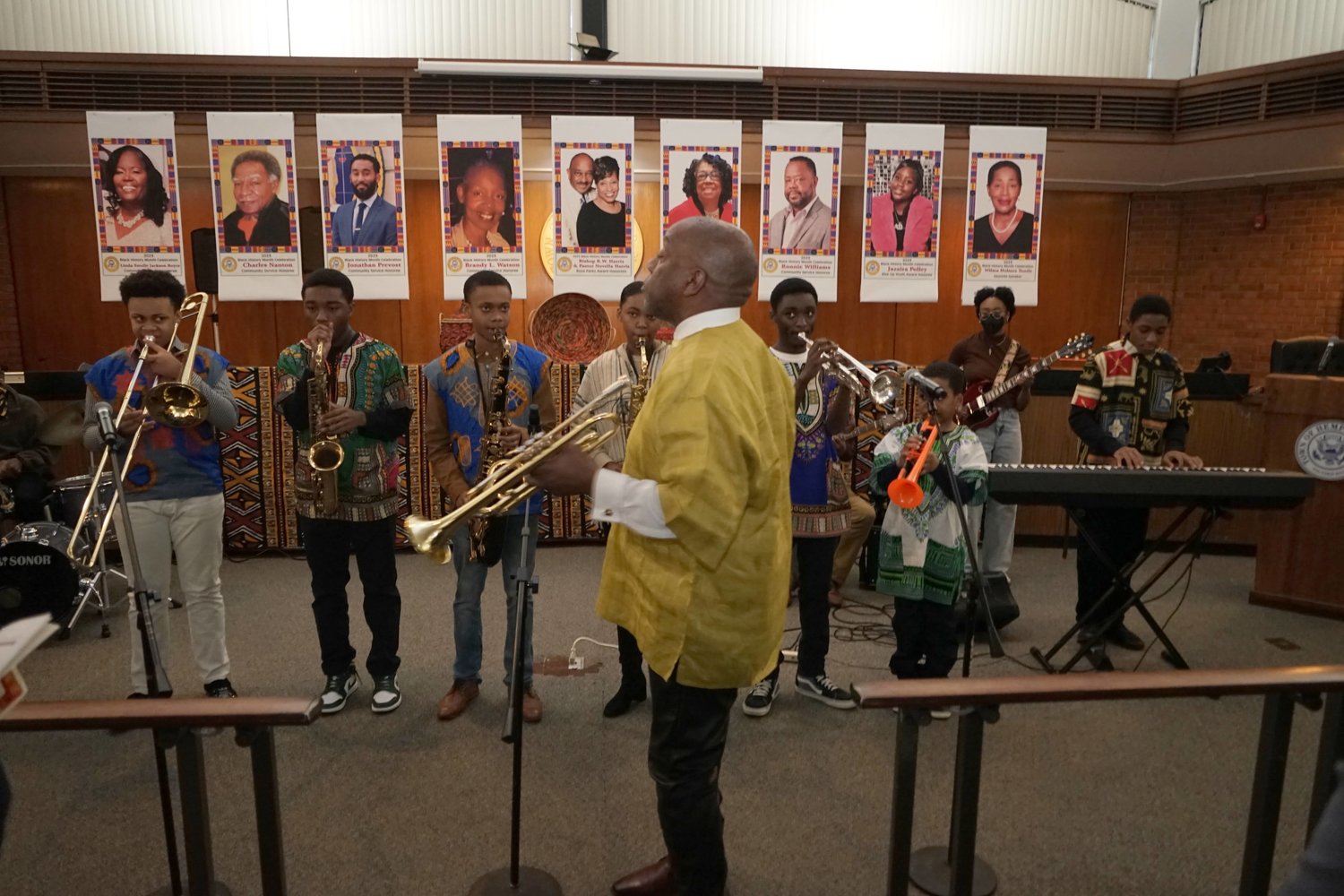‘Black Resistance’ is theme of Town Black History program
The Black History celebration at Hempstead Town Hall on Feb. 24 reminded viewers that Black resistance to racial discrimination is not about fostering violence or hate, but about equality for all.
Resistance has been expressed in many ways besides sit-ins, boycotts, walkouts, and strikes. It has also been demonstrated by dauntless Black people who became high achievers in the military, the professions, business, and the arts.
Norman H. Lyons, Bishop at the Fountain of Life Church in Uniondale, opened the ceremony with an invocation. Next, trumpet master Everton Bailey and his remarkable youth ensemble, Instrumental Sounds of Praise, inspired the crowd with a brass rendition of “Lift Every Voice and Sing.”
State Attorney General Letitia James welcomed the crowd packed into the Nathan L. Bennett Pavilion by means of a prerecorded video.
Town Supervisor Don Clavin and Deputy Supervisor Dorothy L. Goosby greeted the audience in person. Terri Banks, Executive Assistant to the Town Board, emceed, assisted by Shelley Brazley.
A group of children in period clothing charmed their watchers with brief portrayals of major Black civil rights figures. Singer Remy Martin filled the auditorium with his powerful, flexible voice singing Sam Cooke’s “A Change Is Gonna Come,” among other songs. Two women from the Grace Cathedral Next Level Praise Dancers invoked holiness and joy with energetic African-style dance, their white costumes a brisk complement to the colorful posters of Community Service Award recipients arranged on the wall behind them.
The printed program contained information packets detailing the achievements of the many honorees.
Of note were two speakers: keynote speaker Wilma Holmes Tootle, and Marine Corps veteran Kelly Atkinson, vice president of the New Jersey Chapter of the National Montford Point Marine Association, Inc.
Tootle is a retired career educator and current president of the National Coalition of 100 Black Women, Long Island Chapter, Inc.
Tootle grew up in segregated Alabama. She holds degrees from several universities and an honorary doctorate from Monrovia College in Liberia. Her long service includes important administrative positions in the Hempstead and Uniondale public schools.
“She gives so much of herself,” said Deputy Supervisor Goosby, who introduced Tootle. “And every child who has been with her has grown, and that’s what we like.”
Tootle announced that the theme of her speech was, “You won’t break my soul.” She explained how Black people used culture to strengthen anti-discrimination resistance across centuries.
Tottle listed a cadre of now-famous songs: “Swing Low, Sweet Chariot,” which Harriet Tubman used to guide Southern slaves to freedom; “Lift Every Voice and Sing,” James Weldon Johnson’s poem commemorating Abraham Lincoln’s birthday in 1900, which J. Rosamond Johnson set to music, now known as the Negro National Anthem; “Strange Fruit,” written in 1939 by a Jewish high school teacher named Abel Meeropol to protest lynchings he had witnessed in Indiana, and made famous by Black singer Billie Holliday; “A Change Is Gonna Come,” written and recorded by Black recording artist Sam Cooke in 1964; “We Shall Overcome,” a gospel song in Black churches dating to 1901, which became the litany of the civil rights era; and James Brown’s 1968 anthem, “Say It Loud: I’m Black and I’m Proud.”
Tootle told her listeners, “Black resistance means this: working to open the door of America a little bit wider so that Black people, as well as everybody, can achieve equality.”
Tootle’s message was amplified by Atkinson, one of six Marine veterans who attended the program. All are members of the National Montford Point Marines Association.
Atkinson spoke following a video montage about the 20,000 roughly Black Marines who trained at Montford Point Marine boot camp in Jacksonville, North Carolina, 1942–49. The entire group was belatedly awarded the Congressional Gold Medal in 2012.
Atkinson explained that Black servicemen served under George Washington in the Revolutionary War. But after Washington became the first U.S. president, Secretary of War James McHenry barred people of color from the U.S. military.
Not until 1942, when President Franklin D. Roosevelt signed Executive Order 8802, could Black men enter the Marines. But the Black recruits were not sent to Parris Island for Marine Corps training, because the governor of South Carolina barred Black recruits from the state.
“So these Black men were stuck in North Carolina,” Atkinson said, “and put on buses that took them to a dilapidated camp that had no housing, that was infested with bears and snakes. … The first two platoons of men that arrived as Marines built Montford Point camp. They were living in huts. They were sent there to fail. But today I stand on their shoulders because they did not fail.”
Atkinson’s words were echoed by the 14 honorees of the evening, ranging from Montford Point Marines who came from Long Island to pastors, community activists, and educators.

 45.0°,
Mostly Cloudy
45.0°,
Mostly Cloudy 




